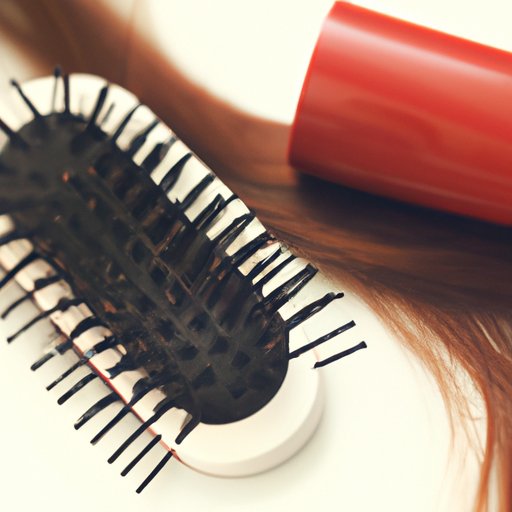
I. Introduction
Cowlicks can be a frustrating issue for many individuals. These pesky sections of hair that stick up and refuse to be tamed can make styling difficult and leave people feeling self-conscious. The good news is that there are a variety of remedies and techniques that can help to tame cowlicks and make hair more manageable. The purpose of this article is to provide readers with natural remedies, styling tips, haircut suggestions, heat tool advice, and hair care habits to help get rid of cowlicks.
II. Natural Remedies
One natural remedy to help tame cowlicks is egg whites. Simply beat one or two egg whites until frothy and apply to hair, focusing on the cowlick. Leave on for 20-30 minutes before rinsing with cold water. Another remedy is coconut oil which can be applied directly to the cowlick. Leave on for 10-15 minutes before washing hair with shampoo and conditioner. A third option is Aloe Vera which can be applied directly to the cowlick overnight before washing out in the morning. These remedies can be used once a week and may help to tame the cowlick over time.
III. Styling Tips
There are a variety of styling techniques that can help to hide cowlicks. One method is to braid the hair, which can help to flatten hair and keep it in place. Another technique is to use a blow dryer, using a brush to pull hair in the opposite direction of the cowlick while drying. Hair products like mousses and hair gels can also be used to help keep the cowlick in place. Apply the product to the hair, focusing on the cowlick, before styling.
IV. Haircuts
Choosing a flattering haircut can help to hide and tame cowlicks. Shorter cuts like pixie and bob styles can often work well to blend the cowlick into the rest of the hair. Longer styles like layers can also be effective. Bangs can help to cover a cowlick on the forehead. It’s important to find a stylist who is familiar with cowlicks and can suggest a style that will work best for each specific individual.
V. Heat Tools
Straighteners and curling irons can be effective heat tools for taming cowlicks. Use the tool to pull the hair in the opposite direction of the cowlick, holding for a few seconds and then releasing. It’s important to use a heat protectant spray before using these tools and to not overuse them, as they can cause damage to hair over time.
VI. Haircare Habits
Developing good hair care habits can help to prevent cowlicks from forming in the first place. Avoid brushing hair while wet or using a towel to dry, as this can cause damage and disrupt the hair’s natural growth pattern. Regular trims can also help to keep hair manageable and prevent cowlicks from forming. Applying a deep conditioning treatment once a week can also help to keep hair healthy and more manageable.
VII. Conclusion
Cowlicks can be a frustrating and persistent issue for many individuals, but there are a variety of techniques and products that can help to tame and hide them. From natural remedies like egg whites and coconut oil, to styling tips like braiding and blow drying, there are various options to explore. Choosing a flattering haircut and using heat tools effectively can also help to manage cowlicks. Developing good hair care habits can help to prevent cowlicks from forming in the first place. It’s important to try different techniques and products until the best method is found for each individual.





